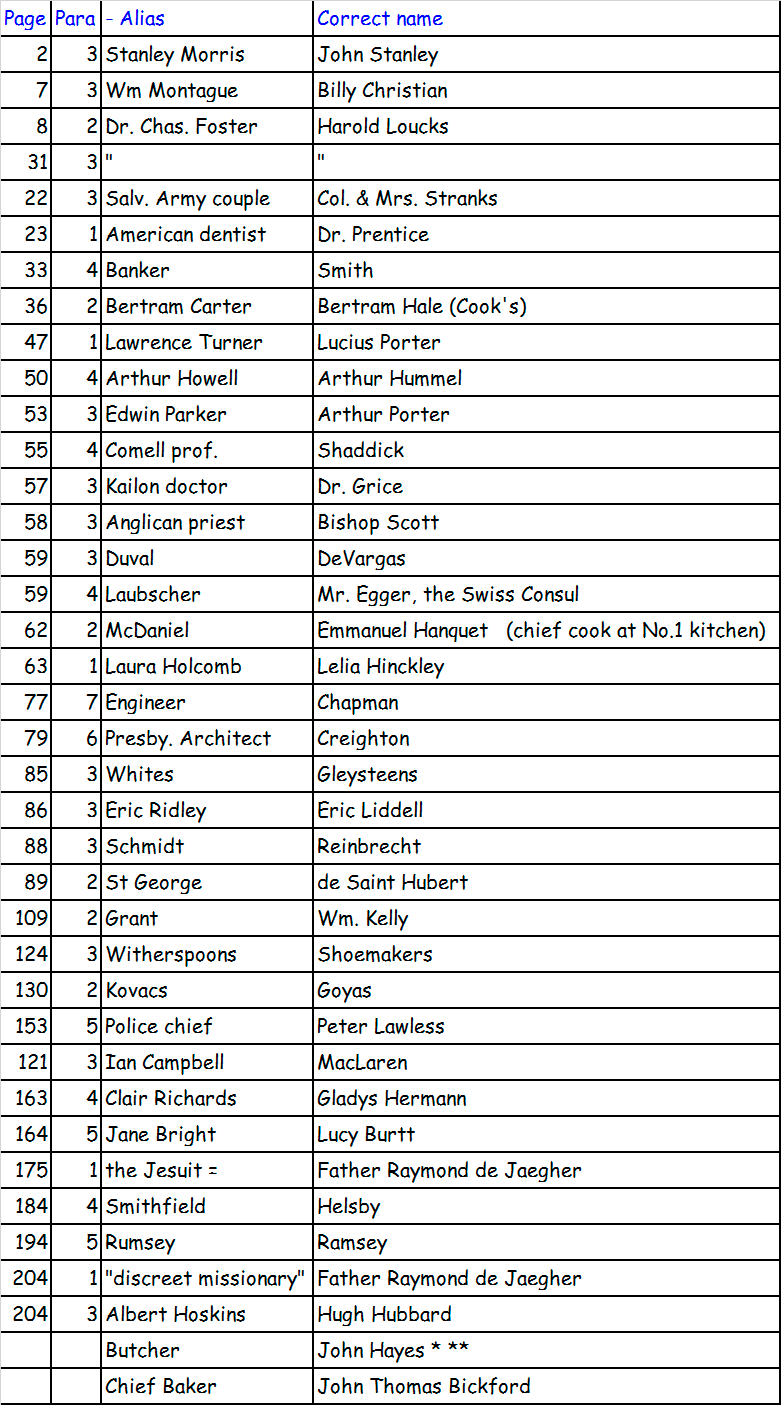Shantung Compound
by Langdon Gilkey
Table of contents:
Preface
I
Into the Unknown
II
Learning to Live
III
Eggs, Guards, and Love
IV
Medicines and Recipes, or How to Outwit Circumstances
V
A Place of One's Own
VI
A Mixed Blessing
VII
Sugar—and Politics
VIII
Threat of Anarchy
IX
Saints, Priests, and Preachers
X
More Saints, Priests, and Preachers
XI
Living for What?
XII
Rescue from the Clouds
XIII
Last Days at Weihsien
XIV
After It Was All Over
Drawings by the author
I
Into the Unknown

II
Learning to Live
III
Eggs, Guards, and Love
IV
Medicines and Recipes, or How to Outwit Circumstances
V
A Place of One's Own
VI
A Mixed Blessing
VII
Sugar—and Politics
VIII
Threat of Anarchy
IX
Saints, Priests, and Preachers
X
More Saints, Priests, and Preachers
XI
Living for What?
XII
Rescue from the Clouds
XIII
Last Days at Weihsien
XIV
After It Was All Over
Drawings by the author
Preface:
This book is about the life of a civilian internment camp in North China during the war against Japan. Unlike some other volumes dealing with such a subject, this one has no horrors to relate. We in the Weihsien camp suffered no extreme hardships of limb, stomach, or spirit. As the quotation from Brecht hints, our problems were created more by our own behavior than by our Japanese captors. Thus, compared to many other internment camps, both in Asia and in Europe, ours was in fact nearly an ordinary life. That is precisely what gives the story its interest and excitement, and why it is here told.
This was a life almost normal, and yet intensely difficult, very near to our usual crises and problems, and yet precarious in the extreme. Thus my story relates an experience within which one of those rare glimpses of the nature of men and of their communal life is possible. In our internment camp we were secure and comfortable enough to accomplish in large part the creation and maintenance of a small civilization; but our life was sufficiently close to the margin of survival to reveal the vast difficulties of that task. Had we been continually tortured and starved, no representative communal existence would have been possible; had our life been more secure, the basic problems of our human lot might not have manifested themselves so clearly. Thus, as the laboratory reveals the structure of what is studied by reducing it to manageable size and subjecting it to increased pressure, so this internment camp reduced society, ordinarily large and complex, to viewable size, and by subjecting life to greatly increased tension laid bare its essential structures. Because internment-camp life seems to reveal more clearly than does ordinary experience the anatomy of man's common social and moral problems and the bases of human communal existence, this book finally has been written.
The reader may well wonder how anyone can remember details and episodes of an experience twenty years in the past.
The answer is that I kept a rather lengthy journal during the internment in which were set down every fact and happening, every problem and its resolution, that came to my attention. Thus the main resource for these chapters stands very close to the life described, for the journal was largely written in camp and was completed shortly after my return to the United States in November, 1945.
I have often been asked why we did not try to escape. The reason was simple: a Westerner cannot wander unrecognized through the Chinese countryside as he might in Europe. His face and color identify him at once to any onlooker. He is thus infinitely vulnerable to any Chinese seeking the reward for his capture. To escape successfully, he must join a guerrilla band at once, who can hide and protect him. But guerrilla bands only wish to care for those who are strong, who possess some special skill that can help the group, and who speak fluent Chinese. Contacts with the guerrillas were, moreover, difficult and rare. Consequently, only two men were able to make such contacts as to allow them to escape; those of us who spoke little Chinese or had no special skills were never even considered.
Finally, it is inevitable that in attempting an analysis of our problems I should describe the "sins" as well as the virtues of the people in the camp. For this is essentially the subject of our story. Necessarily, therefore, this book seems to be describing the foibles, weaknesses, lapses, and selfishness of other folk, so that the impression might be given that I alone trod a saintly path through the life of the camp. At the outset it is important to state that any such impression would be false: no one stood apart from our common weaknesses and our common sins, and certainly I least of all. Different temptations beset and conquer different persons. While as an unencumbered bachelor of twenty-four, I may not have been as concerned as some others about space, food, and security, and so have been able to resist many of the temptations described in the following pages, nevertheless, I had my own moral problems in which I failed as miserably as others did in theirs. All men—each in his own way—need the forgiving grace of God if they would be whole. This is an essential note of the Christian gospel, and it has certainly been the continual lesson of my own life. If then the "sins" of other men seem to be described and analyzed in this volume, let it be remembered that another book on the camp could easily tell our tale with a different cast (doubtless including me, too), playing slightly different roles but enacting ultimately the same story. To save embarrassment all around, I have changed the name of every person mentioned in the book.
Langdon Gilkey

| Alias | Correct Name |
|---|---|
| * NCAS Tungchow | |
| related | |
| Stanley Morris | John Stanley * |
| Wm Montague | Billy Christian |
| Dr. Chas. Foster | Harold Loucks |
| Salv. Army couple | Col. & Mrs. Stranks |
| American dentist | Dr. Prentice |
| Banker | Smith |
| Bertram Carter | Bertram Hale (Cook's) |
| Lawrence Turner | Lucius Porter * |
| Arthur Howell | Arthur Hummel |
| Edwin Parker | Arthur Porter |
| Cornell prof. | Shaddick |
| Kailon doctor | Dr. Grice |
| Anglican priest | Bishop Scott |
| Duval | DeVargas |
| Laura Holcomb | Lelia Hinckley |
| Engineer | Chapman |
| Presby. Architect | Creighton |
| Whites | Gleysteens * |
| Eric Ridley | Eric Liddell |
| Schmidt | Reinbrecht |
| Grant | Wm. Kelly |
| Wilherspoons | Shoemakers |
| Police chief | Peter Lawless |
| Ian Campbell | MacLaren |
| Clair Richards | Gladys Hermann |
| Jane Bright | Lucy Burtt |
| Smithfield | Helsby |
| Rumsev | Ramsey |
| Albert Hoskins | Hugh Hubbard * |
| Butcher | John Hayes *** |
| Chief Baker | John Thomas Bickford * |
From Pamela Masters:
Chesterton = Bill Chilton, KMA Port Administrator, Chinwangtao, promoted to a top executive position in the Kailan when he out-bluffed the Japanese Imperial Army in North China. (See page 31, The Mushroom Years for details, it's worth a read)
An interesting side-bar: Bill Chilton was actually a Texan who ran away to sea and joined the Royal Navy, retiring with the rank of commander. He was not short, as Gilkey has him, but tall and lean, with the sad face of a bloodhound. And yes, he spoke very, very slowly and distinctly.
From Pamela Masters:
W.T. Roxby-Jones = Pierre Travers-Smith, RA. (Royal Academy) It takes a helluva great artist to get hung in the Royal Academy in London, and the beautiful water color of the guard tower at sunset is his.
(last two names added by Gladys Hubbard Swift with information given by their daughters, Margaret Hayes Hollister and Esther Bickford Shackelford. Will be glad to add other information:- (GHS 1311 Branchlands Drive, Charlottesville, VA 22901-1753).
** Margaret Hayes Hollister informed me that her father John Hayes, was the butcher at Weihsien and her grandfather, Watson Hayes, died there. Watson was diabetic and John did steal meat for him. Also Watson Hayes had been stationed in that area of Shantung so the farmers knew him. The fresh eggs were particularly needed for diabetic Watson and he was instrumental in getting them (p. 36). Note from GHS – Ed
GLADYS HUBBARD SWIFT '40 - At the request of many friends I have sent copies of this "Suggested Key to People Interned in Weihsien and mentioned in Shantung Compound by Langdon Gilkey". For those of you who have not seen the list, like those below, here is the list made by my father, Hugh Hubbard...
WELLINGTON Z. MYERS '38 (2-19-96) - I called Joyce Ditmanson [PAS Faculty] to get her maiden name, which is Stranks. She stated that her father was with the Salvation Army (Australian) and was quite friendly with your father [Hugh Hubbard]... Marcy (Ditmanson PAS '36] does not believe their names were in "Shantung Compound" [No, but see 5th line Shantung Compound Key prepared by Hugh Hubbard. I was at Yenching, class of 1944, with Joyce's brother, Gordon Stranks, in 1940-41 - GHS Ed]
JAMES ROBINSON '37 (2-17-96) - Herewith ... the following ... a connection to some of us -- failure of memory and recognition -- is conceivable. Recently in an airport a man looked familiar, and the longer I looked the more familiar, though he showed total lack of recognition as he returned my gaze. Finally I took the plunge and said "are you a twin?" You should have seen his jaw drop, for he was indeed a former patient who did have a brother that was a very identical twin. After establishing identities, I reminded him of an episode when he was hospitalized under my care. His brother came to visit him one day. A nurse saw him walking down the hall, pointed and shouted, "What are you doing with your clothes on?”






